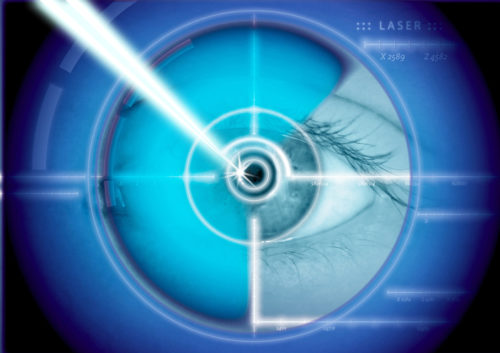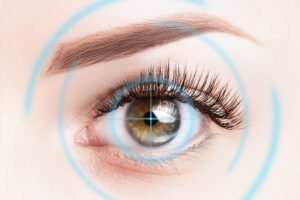
Medical technology continues to make leaps and bounds on, what seems to be, a never basis. The funding and demand more for new and improved technology and equipment to provide better healthcare on grows.
In the field of vision correction, several new advances have helped millions of Americans regain their independence from the hassle of glasses or contacts, thanks to laser refractive surgery. Lasik has been the household name for laser eye surgery since the FDA approved the use of lasers for in 1995.
Since then, several new lasers and surgeries have developed, making the list of choices longer for patients to choose from. While each type of laser has its advantages, we’re going to provide a brief overview of how excimer lasers work in Lasik and some of the best Lasik technology used today.
In 1995, the FDA approved the use of the Apex excimer laser to perform PRK surgery to correct for myopia (nearsightedness). Since then, excimer lasers have transformed the way doctors are able to correct vision.
When used in eye surgery, excimer lasers have the capability to reshape the cornea by removing or ablating microscopic amounts of tissue. Guided by a computer that is set to the patient’s unique prescription, excimer lasers have an exceptional high-degree of accuracy.
How Excimer Lasers Work
When the word laser comes to mind, the most common thought is heat and sci-fi movies. But what makes excimer lasers unique is their ability to use ultraviolet light, rather than infrared, to remove the desired tissue. By using ultraviolet light, at a wavelength of 193 nanometers, there is far less discomfort and virtually no pain.
Infrared lasers involve wavelengths in excess of 700 nanometers making them dangerous for use on the eye, where precision and control are key. Utilizing a shorter wavelength, surgeons are able to remove microscopic amounts (as small as 0.25 microns) of cornea tissue to provide the proper corrections necessary for the clearest vision possible.
Depending on the degree and type of refractive error, the laser, which is guided by computer, will remove only the necessary cornea tissue, through high-energy pulses of UV light, to allow the light to focus properly on the retina. Refractive errors (nearsighted, farsighted and astigmatism) are all caused by the improper focusing of light as it passes through the cornea in attempt to focus on the retina.
The good news is that all of the refractive errors are easily corrected through the use of excimer lasers (depending on the degree of error). For nearsighted patients, the cornea is reshaped by removing some of the steepness of the cornea.
The cornea is made steeper for patients that suffer from farsightedness and astigmatism can be corrected for by smoothing out any irregularities in the cornea surface to allow the light to focus properly on the retina.
Prior to the surgery, a final evaluation of vision is performed to provide the most up-to-date measurements for the corrections. Controlled by computer, the excimer laser is set to each patients’ unique refractive error. Modern excimer lasers have automated eye-tracking systems in place that enhance the accuracy of the procedure by keeping the laser on target despite any unplanned eye movements.
There are several excimer lasers on the market and each utilizes slightly different technology but all produce exceptional results. Many surgeons are trained using a specific brand and model, which make them extremely proficient in their use. Here are some of the top FDA-approved excimer lasers used today by surgeons around the country.
- STAR S4 IR Excimer Laser System
- Nidek EC-5000 Excimer Laser System
- Allegretto WAVE Eye-Q Excimer Laser System
- MEDITEC MEL 80 Excimer Laser System
- LADARVIsion 4000 Excimer Laser System
- TECHNOLAS 217Z Zyoptix System for Personalized Vision Correction
New models and improvements are being tested and approved in order to provide the very best vision correction possible. It can be hard to say which one is the best Lasik laser because the best tool in the wrong hands can produce poor results.
What matters most in Lasik surgery is your surgeon’s experience, skill, evaluation of your specific vision errors and your candidacy as a suitable Lasik patient.
With that being said, if you are considering Lasik surgery, you have come to the right place. At Diamond Vision, we pride ourselves on exceptional results and complete patient satisfaction. We truly believe that clear vision should be experienced by all and our award-winning staff of surgeons and medical professionals will help you achieve the clearest vision possible.
There is no better time to rid yourself of those glasses or contacts and experience what Lasik can do for you.
Contact Us
If you have more questions about LASIK procedures, get in touch with us.
Related Blogs

Timing is Everything: When to Consider LASIK After Nursing for Optimal Results
Timing is everything when considering LASIK eye surgery after nursing, and understanding the optimal period for this procedure is vital for both mother and baby.

Cataract Surgery: Restoring Clarity and Confidence
Cataract surgery is a transformative procedure that offers a new lease on clear vision and renewed confidence. As cataracts cloud the eye’s lens, causing blurred

Intralase LASIK Explained: What to Expect Before, During, and After the Procedure
Intralase LASIK is a cutting-edge procedure that offers a safe, effective, and precise way to enhance vision compared to traditional LASIK methods. Understanding what to
